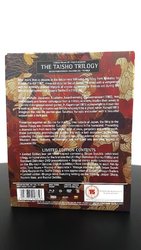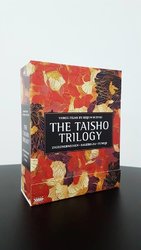Synopsis:
HAUNTING, HYPNOTIC, FLAMBOYANT, EROTIC, BIZARRE… SUZUKI!
After over a decade in the wilderness following his firing from Nikkatsu for Branded to Kill (1967), maverick director Seijun Suzuki returned with a vengeance with his critically-praised tryptic of cryptic supernatural dramas set during the liberal enlightenment of Japan’s Taisho Era (1912-26).
In the multiple Japanese Academy Award-winning Zigeunerweisen (1980), two intellectuals and former colleagues from military academy involve their wives in a series of dangerous sexual games. In Kageroza (1981), a playwright is drawn like a moth to a flame to a mysterious beauty who might be a ghost, while Yumeji (1991) imagines the real-life painter-poet Takehisa Yumeji’s encounter with a beautiful widow with a dark past.
Presented together on Blu-ray for the first time outside of Japan, the films in the Taisho Trilogy are considered Suzuki’s masterpieces in his homeland. Presenting a dramatic turn from more his familiar tales of cops, gangsters and unruly youth, these surrealistic psychological puzzles drip with a lush exoticism, distinctively capturing the pandemonium of a bygone age of decadence and excess, when Western ideas, fashions, technologies and art fused into everyday aspect of Japanese life.
SPECIAL EDITION CONTENTS
- High Definition Blu-ray (1080p) and Standard Definition DVD presentations
- Original stereo audio (uncompressed on the Blu-ray)
- Optional English subtitles
- New introductions to each film by critic Tony Rayns
- Making-of featurette
- Vintage interview with Seijun Suzuki
- More to be announced…
FIRST PRESSING ONLY: Booklet featuring writing on the films by critic Jasper Sharp and more.









